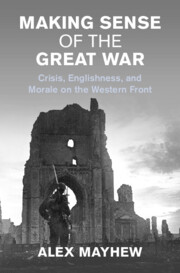Book contents
- Making Sense of the Great War
- Studies in the Social and Cultural History of Modern Warfare
- Making Sense of the Great War
- Copyright page
- Dedication
- Contents
- List of Figures
- List of Tables
- Acknowledgements
- Abbreviations
- Map of the Western Front
- Prologue
- Introduction
- Part I The Environment
- Part II Social Groups
- Part III Crisis and Morale
- 5 Hoping for Peace
- 6 Experiencing Crisis
- Conclusion
- Appendix Demographics of Six English Regiments in the BEF
- Bibliography
- Index
5 - Hoping for Peace
Victory and the Future
from Part III - Crisis and Morale
Published online by Cambridge University Press: 11 April 2024
- Making Sense of the Great War
- Studies in the Social and Cultural History of Modern Warfare
- Making Sense of the Great War
- Copyright page
- Dedication
- Contents
- List of Figures
- List of Tables
- Acknowledgements
- Abbreviations
- Map of the Western Front
- Prologue
- Introduction
- Part I The Environment
- Part II Social Groups
- Part III Crisis and Morale
- 5 Hoping for Peace
- 6 Experiencing Crisis
- Conclusion
- Appendix Demographics of Six English Regiments in the BEF
- Bibliography
- Index
Summary
Soldiers’ desires to craft a narrative out of the war experience encouraged them to look towards the future. This chapter focuses on another central feature of soldiers’ psychologies: their hope. Infantrymen invested themselves in visions of victorious peace, which supported their morale and encouraged resilience. Nonetheless, their hopes for peace changed over the course of the war. At the end of 1914 and 1916, soldiers remained confident that the next year’s campaigning would bring the war to a successful close. However, their experiences in 1917 left them uncertain that victory was even possible. Censors noted that men began considering the likelihood of a negotiated peace during this period. Nevertheless, the German offensives of 1918 restored men’s faith in victorious peace. Soldiers gleaned immense psychological benefits from their investment in a peaceful future. Hope was a coping mechanism fed by memories, dreams, and fantasies that provided a vision of an alternative world devoid of war: something the men could fight for. Infantrymen developed personal life goals, which instilled their service with a depth of meaning that was itself sustaining. A variety of things fuelled their hope and optimistic reasoning: religion, prisoners, war souvenirs, and rumour all fed hope. Significantly, too, most of these soldiers believed that the German state had to be defeated were there ever to be a lasting peace. More subtle psychological mechanisms were also essential: optimism, certainty, language, acculturation, and the sense of success. So long as men were able to conceive of the war as just, necessary, and winnable they were generally willing to endure the stresses of service.
- Type
- Chapter
- Information
- Making Sense of the Great WarCrisis, Englishness, and Morale on the Western Front, pp. 197 - 231Publisher: Cambridge University PressPrint publication year: 2024

